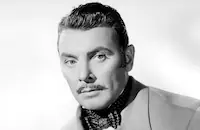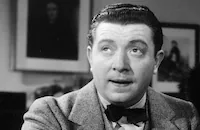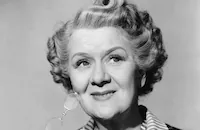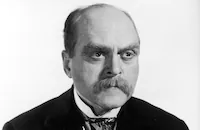Lilly Turner

Brief Synopsis
Cast & Crew
William A. Wellman
Ruth Chatterton
George Brent
Frank Mchugh
Guy Kibbee
Robert Barrat
Film Details
Technical Specs

Synopsis
Lilly Turner innocently marries the flamboyant, dishonest Rex Durkee, a magician in a cheap carnival, but within a few months, she is deeply disillusioned. When another woman turns up claiming that she is his wife and charges Rex with bigamy, he abandons the pregnant Lilly. Her kindhearted friend Dave Dixon marries her so that the child can have a name, but the baby dies and the couple ends up working in a series of cheap sideshows. Dave's habitual drinking drives Lilly to a succession of lovers, until she meets Bob Chandler, an unemployed engineer who is driving a taxi to earn a living. She convinces him to join the show as the strong man, and Bob falls in love with her in spite of her past. They plan to run away to Mexico, but the night before they are to leave, Fritz, the strong man Bob replaced, escapes from a mental asylum, attacks Lilly, injures Bob and breaks Dave's spine. Dave begs Lilly not to leave him, and remembering how he helped her once, she tells Bob her duty is to Dave. Bob understands, but promises to love her always.

Director

William A. Wellman
Cast

Ruth Chatterton

George Brent

Frank Mchugh

Guy Kibbee

Robert Barrat

Ruth Donnelly

Marjorie Gateson
Gordon Westcott
Arthur Vinton

Grant Mitchell
Margaret Seddon

Mae Busch

Irving Bacon

Mayo Methot

Ethel Wales
Crew

Film Details
Technical Specs

Articles
Lilly Turner
After a distinguished career on the New York stage, Chatterton was part of the wave of theater performers who had gone to Hollywood at the beginning of the sound era. Already in her mid-30s and not conventionally pretty, Chatterton was nevertheless a great success in films, bringing a sense of "class" to the medium, and was twice nominated for Oscars®, for Madame X (1929) and Sarah and Son (1930). Unlike many stage actors of the era, Chatterton did not use exaggerated diction or grand gestures. Her acting style was naturalistic, her way of speaking staccato, distinctive, and charming, her facial expressiveness small but precise. Although her normal speech was cultured, in Lilly Turner Chatterton is playing a working class character, so she drops her g's, but it seems natural, not affected. In his book about pre-code film actresses, Complicated Women (2000), Mick LaSalle called Chatterton "a vision of total female authority, circa 1930. Even in weepies, she was commanding. Short and slightly plump, Chatterton was convinced she was beautiful, and she convinced everybody else, too. She had a baleful stare and yet a surprisingly mischievous, almost childlike, smile. She was a diva."
Lilly Turner was the second film together for Chatterton and director William A. Wellman. A "man's man" with a preference for action films and a contempt for divas, Wellman was not happy when he was assigned to direct Frisco Jenny (1932) with Chatterton. The dislike was mutual, but after three days of icy silence between them, director and star called a truce, recognizing each other's talents, and becoming great fans of each other. Frisco Jenny would be Chatterton's favorite film. While she and Wellman were happy to work together again, Lilly Turner was not as good as Frisco Jenny. For Wellman, Lilly Turner was just another programmer, one of six that he cranked out in 1933 under contract at Warner Bros. In spite of the grim story, Wellman gives the carnival scenes a certain seedy vitality. And reliable character actors Guy Kibbee as the medicine show boss, and Frank McHugh as Lilly's bibulous husband get a chance to play characters with a few more facets than their usual one-note comedy roles. Mordaunt Hall noted in the New York Times that Kibbee "does remarkably well by the part." But as for Chatterton, she "is not in her element in such a narrative, for she is obviously far better suited to a more sophisticated subject." The Variety reviewer wrote that the film "fails to measure better than fair," but had praise for Chatterton's efforts, saying "Picture is Miss Chatterton's all the way, star making every effort to give what the story lacks and what is missing in the direction." In spite of such reviews, Lilly Turner was a box-office success.
Lilly Turner is clearly a pre-Code film, dealing frankly with Lilly's sexual affairs, and that may be the reason why it wasn't seen for many years. According to studio records, in 1936, Warner Bros. tried to reissue it, but was denied a Production Code certificate.
Director: William A. Wellman
Screenplay: Gene Markey, Kathryn Scola, based on a play by Phillip Dunning and George Abbott
Cinematography: James Van Trees
Editor: James Gibbon
Costume Design: Orry-Kelly
Art Direction: Jack Okey
Principal Cast: Ruth Chatterton (Lilly Turner), George Brent (Bob Chandler), Frank McHugh (Dave Dixon), Guy Kibbee (Doc McGill), Robert Barrat (Fritz), Ruth Donnelly (Edna), Marjorie Gateson (Mrs. McGill), Gordon Westcott (Rex Durkee).
BW-65m.
by Margarita Landazuri

Lilly Turner
Quotes
Trivia
Warner Bros. tried to re-release the movie in 1936, but the Production Code office refused to award an approval certificate.
The original play opened in New York on 19 September 1932.
Notes
In 1936, when Warner Bros. submitted a request to the censorship office to reissue the film, Joseph Breen denied them a Code certificate. According to Warner Bros. files, Lyle Talbot was originally cast as Rex. Modern sources list additional cast members as Hobart Cavanaugh, Katherine Clare Ward and Lucille Ward.















